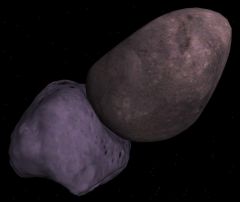617 Patroclus
| 617 Petroclus | |
|---|---|

| |
| 617 Petroclus from Trojans.zip in Orbiter 2006P1 | |
| Designation | |
| Name | 617 Petroclus |
| Reference body | Sun |
| Planetary mean orbits | |
| Epoch | 2009.46064339 |
| Semimajor axis (a) | 778417560353.55 m |
| Eccentricity (e) | 0.1395242409075892 |
| Inclination (i) | 22.0468058769034° (0.3847893521 radian) |
| Longitude of the ascending node (LAN, ☊) | 44.3517600541835° (0.7740842420 radian) |
| Longitude of periapsis (ϖ) | 351.799701287534° (6.1400630950 radian) |
| Mean longitude (L) | 257.848801431457° (4.5003105573 radian) |
| Selected physical parameters | |
| Mean radius | 70500 m |
| Mass | 1.3×1018 kg |
| Rotation elements | |
| SidRotPeriod | 46600 seconds (12.944 hours) |
| SidRotOffset | 0 |
| Obliqutiy | 0 |
| LAN | 0 |
| Note | *Elements given are from 617 Patroclus.cfg (Trojans.zip) |
617 Patroclus (1906 VY, 1941 XC, 1962 NB) is a large binary Jupiter Trojan asteroid of the Greek camp (whose orbits lie in the L4 point 60° behind of Jupiter. It was discovered by August Kopff at the Heidelberg-Königstuhl State Observatory in October 1906 and was named after a Greek hero of the Trojan War and was a character in the Iliad. It is the only trojan in the Trojan camp named for a greek figure. Patroclus is one of the five trojans that is a target of the Lucy mission.
617 Patroclus in Orbiter
617 Patroclus was introduced to orbiter with the release of Trojans.zip add-on in June 2009, and is modeled as a contact binary in Trojans.zip.
| Add-on | Source | Version | Author | Type | Release Date | Compatibility | Wiki article |
|---|---|---|---|---|---|---|---|
| Trojan Asteroids v1.01 | O-F Resources | v1.01 | sputnik | Scenery | 27 June 2009 | ||
See also
Gallery
- center>617 Patoclus imaged by Hubble in February 2018
from Wikimedia Commons
| edit The Solar System | |
|---|---|
| Central star |
Sun (Sol) |
| Planets |
Mercury - Venus - Earth - Mars - Jupiter - Saturn - Uranus - Neptune |
| Natural satellites |
Moon - Phobos - Deimos - Io - Europa - Ganymede - Titan - more... |
| Add-ons |
Planets - Dwarf Planets - Small objects - Natural satellites - Alternative star systems |

